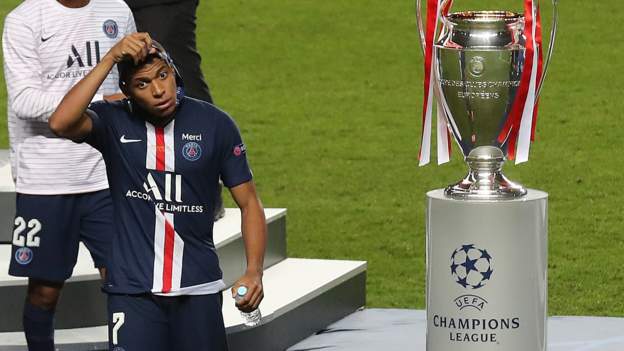I understand your request to paraphrase and complete the text about Paris St-Germain’s success without winning the Champions League. Here’s a revised and extended version of the text:
Paris St-Germain: Defying Convention by Redefining Success
Paris St-Germain (PSG), the French football giants, are no strangers to the limelight. With an impressive roster of superstars, including Neymar, Lionel Messi, Thiago Silva, Angel di Maria, Edinson Cavani, Zlatan Ibrahimovic, and the sensational Kylian Mbappe, PSG has consistently been a force to be reckoned with in the football world. However, despite their star-studded lineup and hefty investments, PSG has been met with skepticism by critics who argue that the club’s true success hinges on winning the UEFA Champions League.
The narrative surrounding PSG’s Champions League quest took an intriguing turn this summer when Kylian Mbappe’s future with the club hung in the balance. It seemed as though the young superstar was on the verge of leaving PSG, possibly to fulfill his boyhood dream of joining Real Madrid. However, since his return to the team, Mbappe has been nothing short of phenomenal, scoring 16 goals in 16 games. His reintegration into the squad has added a layer of excitement to PSG’s season.
But why does PSG need to defy the conventional wisdom that a Champions League victory is the only path to success? Marc Armstrong, the club’s Chief Revenue Officer, has a compelling argument. He firmly rejects the notion that PSG’s status should be diminished because they haven’t lifted the coveted Champions League trophy. “You don’t have to win the Champions League to be a successful football club,” Armstrong asserts.
He points to PSG’s remarkable consistency in reaching the knockout stages of the competition, a feat shared only with European giants Real Madrid and Bayern Munich since the 2012-13 season. Additionally, PSG holds a respectable fourth position in the UEFA coefficient rankings, highlighting their continued competitiveness on the European stage.
Armstrong emphasizes that PSG is embarking on a new sporting strategy, moving away from the era of galacticos, which brought them domestic dominance with nine league titles and six French Cups since Qatar Sports Investments (QSI) took over in 2011. The trio of Mbappe, Neymar, and Messi embodied this approach, but PSG’s focus is shifting towards a different direction on the pitch.
While the football world speculates about Mbappe’s future, Armstrong underscores that PSG’s success isn’t solely dependent on any one player. The club is focused on building its brand and long-term sustainability both on and off the pitch. Commercially, PSG has diversified its sponsorship portfolio, with only a fraction of its revenue coming from Qatari sponsors.
Despite scrutiny regarding the source of their funding, PSG remains confident in their position and dismisses the idea that their success is solely bankrolled by Qatar. As Armstrong points out, “Six of our 35 sponsors are from Qatar, accounting for less than 20% of our global revenue.”
Looking ahead, PSG is committed to their home at the Parc des Princes, but they face the challenge of expanding its capacity significantly. Their preference is to redevelop their historic home within the city limits, although Armstrong acknowledges the substantial investment required for this endeavor.
Furthermore, PSG is investing heavily in reshaping its academy structure, aiming to harness the talent pool in the wider Paris area. Their strategy involves nurturing young talents from a much earlier age, aligning with their long-term vision and brand development.
Beyond the football pitch, PSG’s ambitions extend to the global stage, with QSI exploring opportunities to invest in a Premier League club and expand their presence in key markets. PSG’s journey is marked by ambition and forward momentum, whether they win or lose against Newcastle. With the Eiffel Tower proudly displayed on their badge, PSG continues to evolve and redefine what it means to be a successful football club.
Frequently Asked Questions (FAQs) about PSG Success Strategy
Q: Is winning the Champions League the only measure of success for PSG?
A: No, winning the Champions League is not the sole indicator of success for Paris St-Germain (PSG). While it’s a prestigious trophy, PSG has consistently performed well in the competition, reaching finals and semifinals. Their success also extends to domestic titles and long-term brand building.
Q: What is PSG’s new sporting strategy?
A: PSG is transitioning away from the ‘galacticos’ era of star-studded signings like Neymar, Messi, and Mbappe. They are focusing on nurturing young talents through their academy and building a sustainable, competitive squad for the future.
Q: How does PSG address questions about their funding source?
A: PSG dismisses the notion that most of their revenue comes from Qatari sponsors. They emphasize diversifying their sponsorship portfolio and highlight that only a fraction of their revenue, around 20%, comes from Qatar.
Q: What are PSG’s plans for their stadium, Parc des Princes?
A: PSG’s preference is to redevelop the Parc des Princes, their historic home within the city limits. However, the significant investment required poses a challenge. They are also exploring alternative options, including the possibility of moving to the Stade de France.
Q: What does PSG’s future look like beyond football?
A: PSG’s ambitions extend beyond football, with plans to invest in a Premier League club and expand their presence in key markets. They are committed to growing their brand and business on a global scale.
More about PSG Success Strategy
- PSG Official Website
- UEFA Champions League
- Qatar Sports Investments (QSI)
- Parc des Princes Stadium
- Kylian Mbappe – Player Profile
- Neymar – Player Profile
- Lionel Messi – Player Profile

1 comment
dis new approach sounds cool, more youth dev and less big $$$ buys.